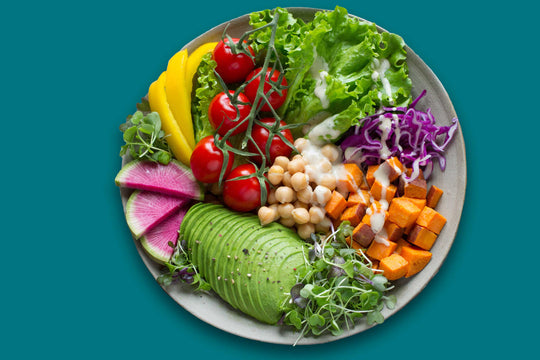
Why Plant-Based Nutrition?

The New Year is a time to start fresh and set goals and resolutions for some. Those are great, but at Sperri we believe in meeting you where you are on your journey to living well.
At this time of year, that can mean getting back to basics, including getting better sleep, going outside more often, meditating daily or incorporating plant-based options—whatever helps you live well.
Sperri offers complete plant-based nutrition with our meal replacements, but why is plant-based nutrition so important? What are the benefits, and how can you incorporate more plant-based options? Jill Conrod, one of our in-house dietitians, is here to answer your questions!
The Benefits of Plant-Based Nutrition
Plant-based eating is increasingly popular in North America, but it has been the diet of choice for many cultures for generations. People are incorporating plant-based foods into their diets, from plant-based milk, burgers, and yogurt to mighty leafy greens and legumes, more often.
Eating a plant-based diet has been shown to help prevent or reverse heart disease, diabetes, cancer, Alzheimer's and more.
Plant foods such as beans, lentils, nuts, tofu, edamame and tempeh are high in protein and contain vitamins, minerals and many phytochemicals (nutrients from plants). Plus, they're low in saturated fat and are often a great source of fibre.
Improves Gut Health
Dietary fibre only comes from plant foods. A high-fibre diet can decrease cholesterol levels, control blood sugar levels, and aid in overall digestive health. As of 2019, Health Canada modified their Food Guide to incorporate more plant-based protein sources.
Improves Heart Health
Cardiovascular disease is the number one cause of death in North America. Animal proteins such as beef, pork, ham and cheese can be excellent sources of protein; however, they usually contain additional saturated fats. When eaten in excess, these fats can contribute to cardiovascular disease, high blood pressure, stroke and even certain types of cancer.
Provides Options for Those with Allergies and Intolerances
In addition to animal proteins, approximately one-third of North Americans cannot tolerate dairy-based foods. This percentage increases to 70% in medically ill populations such as those with irritable bowel syndrome (IBS).
Improves The Health of The Planet
Plant-based diets have been proven to improve human health, but they also benefit the planet's health in terms of environmental sustainability. Compared to diets rich in animal products, plant-based diets are more sustainable because they use fewer natural resources and are less taxing on the environment.
10% of people identify themselves as vegetarians, which is expected to increase to 30% by 2025. Switching to a plant-based diet may not be realistic for everyone; however, if you aim to eat plant-based at least one day a week, your body may thank you in years to come!